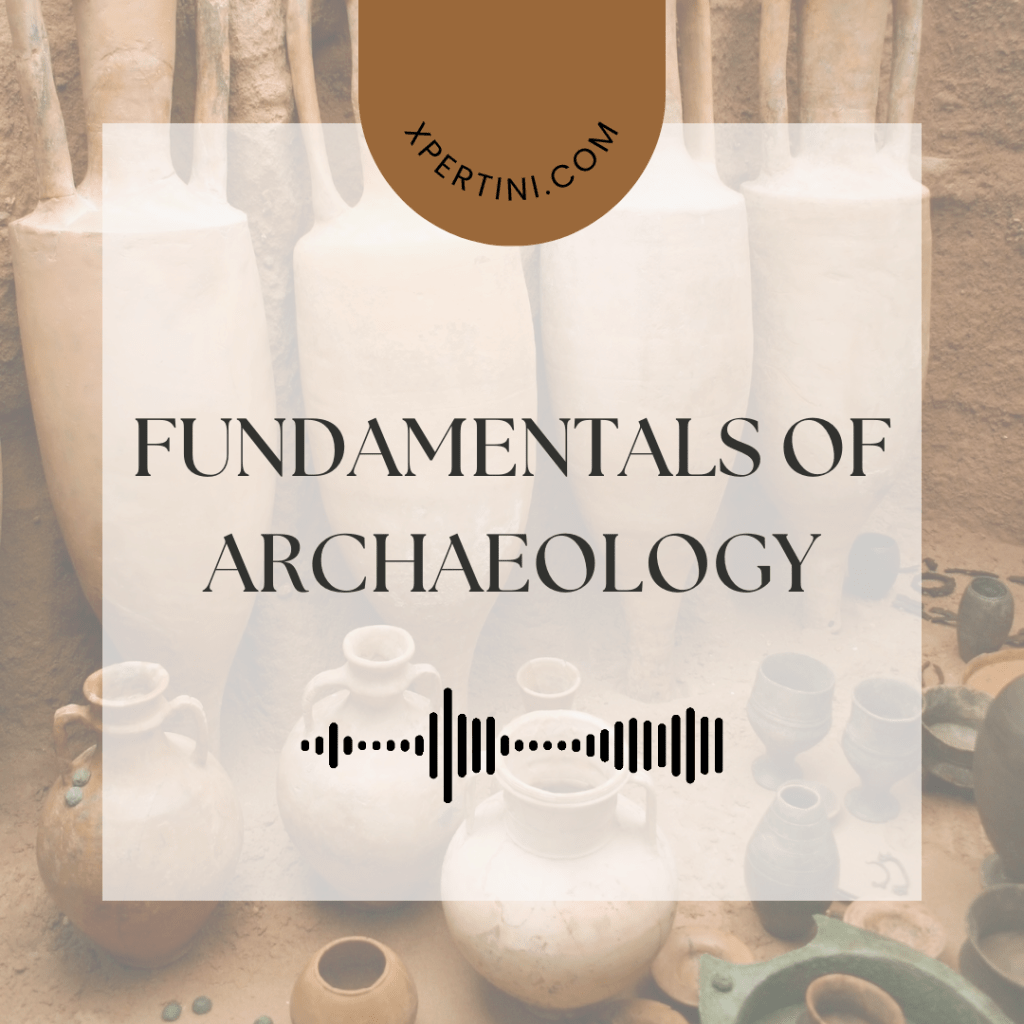Fundamentals of Archaeology
Course Summary
The “Fundamentals of Archaeology” course is meticulously crafted for those fascinated by the enigmas of the past. This course serves as a structured guide, leading participants through vital lessons that unfold the richness of archaeological exploration.
In the initial phase, foundational aspects are introduced, acquainting participants with the archaeological toolkit—a set of versatile and indispensable skills crucial for excavating the past. Following that, the course delves into historical landscapes that have shaped our understanding of archaeology. Analogous to an archaeologist sifting through layers of earth, participants engage in uncovering pivotal moments that have influenced the field.
A detailed expedition through archaeological methods is the focus of another segment, revealing important processes behind excavations. These methods act as keys to unlocking hidden stories, enabling participants to decode the language of artifacts and landscapes. Ethical considerations in archaeological exploration emphasize the role of responsible practices in respecting the cultural artifacts uncovered during discoveries.
The course progresses to exploring archaeology as a puzzle waiting to be solved. Participants discover the art of archaeological interpretation, where fragments are pieced together to reveal the complete picture of ancient civilizations. Principles of preservation and conservation are unfolded, ensuring the threads of history remain intact for future generations. This module serves as a guide on safeguarding delicate artifacts encountered during archaeological quests.
The role of technology in archaeology takes the spotlight in another segment, where cutting-edge tools become companions in demystifying the past. These tools are positioned as technological allies, extending the reach of archaeological endeavors. Participants are transformed into archaeological storytellers in the subsequent module, honing their ability to communicate discoveries. The analogy of curators crafting narratives is employed to illustrate the process of making history accessible and engaging for diverse audiences.
The significance of networking and mentorship is underscored in another lesson, envisioning mentors as seasoned guides steering participants through the complexities of the archaeological landscape. Networks are depicted as bridges connecting individuals to a community passionate about exploration. Finally, the course navigates the diverse career paths in archaeology, allowing participants to chart their personalized courses. The analogy of a career as an archaeological odyssey is employed, with each path leading to new and exciting discoveries.
The archaeological journey is portrayed as an ongoing exploration of the past, offering continuous opportunities to uncover, discover, and shape narratives that connect humanity to shared heritage. Participants are encouraged to metaphorically grab their compasses and begin on this archaeological adventure, initiating the exploration of the fascinating past.
Course Overview
This course is designed to provide a comprehensive understanding of the fundamentals of archaeology, unraveling the mysteries of the past through the lens of artifacts, excavation, and historical context. Whether you’re considering a career in archaeology or seeking to deepen your knowledge, this course will take you on a captivating journey through time.
Course Objectives
- Explore the basic principles and methods of archaeological investigation.
- Understand the significance of artifacts and their role in reconstructing history.
- Analyze archaeological sites and interpret cultural patterns.
- Develop critical thinking skills in evaluating archaeological evidence.
- Gain insights into the ethical considerations of archaeological practices.
- Acquire practical fieldwork skills used by archaeologists.
- Examine the relationship between archaeology and other disciplines.
- Foster an appreciation for cultural heritage preservation.
- Explore the impact of technology on modern archaeological research.
- Engage in discussions about current issues and debates in archaeology.
Course Outcomes
- Demonstrate proficiency in archaeological excavation techniques.
- Analyze and interpret artifacts to reconstruct cultural contexts.
- Understand the chronological development of archaeological methods.
- Evaluate the ethical challenges in archaeological research.
- Apply technological advancements to archaeological analysis.
- Demonstrate effective collaboration in simulated archaeological projects.
- Articulate the interdisciplinary nature of archaeological studies.
- Assess the importance of community engagement in archaeology.
- Synthesize information from various sources to reconstruct historical narratives.
- Propose strategies for sustainable cultural heritage preservation.
Course Audience
- Aspiring archaeologists seeking foundational knowledge.
- Students with an interest in history, anthropology, or related fields.
- Educators looking to enhance their understanding of archaeological principles.
- History enthusiasts eager to explore the mysteries of ancient civilizations.

